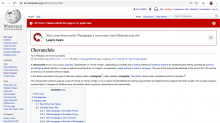As a PM, I want to know if we can identify potential reasons why WWT often fails to load on the first attempt and if there are any potential solutions or work-arounds, so that we can try to implement a more inviting user experience.
Acceptance Criteria:
- Investigate potential reasons why the WWT tool tends to have API errors upon first load
- Determine if there are certain types of errors that are more likely to occur upon first load
- Provide recommendations (if any) that we can implement so that users are less likely to see API errors upon first load
Notes on Behavior:
- When the user first enables WWT, it is very common for the information bar to load rather quickly and display an error message. If the user then tries again (for example, if they refresh and then click on the WWT link again), the tool often loads correctly the second time.
